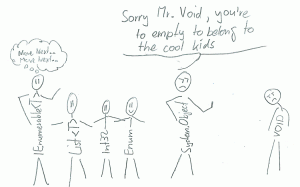Annoying Void in C# / Java / alike
One thing which regularly annoys me in C# and Java is the void type. Basically the void type is not a subtype of object, which makes it giant. Now when you write something which accepts a function as an argument you need two version: A version which accepts a function which returns something and a version which accepts a ‘void-returning’-function (the Action delegates in C#).
In my code I often end up doing something like this:
| class Example | |
| { | |
| // Stuff like transactions, run in contexts, binding methods etc etc. | |
| public T WithSomeContext<T>(Func<T> runInContext) | |
| { | |
| // do magic and stuff | |
| var result = runInContext(); | |
| // do other stuff | |
| return result; | |
| } | |
| // Doublicate to also accept Void returns | |
| public void WithSomeContext(Action runInContext) | |
| { | |
| WithSomeContext<object>(() => | |
| { | |
| runInContext(); | |
| return null; | |
| }); | |
| } | |
| public void UseIt() | |
| { | |
| var valueOne = 1; | |
| var valueTwo = 2; | |
| // with return value | |
| var sum = WithSomeContext(() => valueOne + valueTwo); | |
| WithSomeContext(() => Console.WriteLine("Hi-There")); | |
| } | |
| } |
That’s just boilerplate which I really don’t need. In many other languages, for example Scala, this is handled more elegantly. The void-type (often called Unit) is a regular type. And void/unit values just represent ‘void/unit‘:
| class Example{ | |
| def withContext[T](runInContext:()=>T):T ={ | |
| // do magic and stuff | |
| val result = runInContext(); | |
| // do other stuff | |
| return result; | |
| } | |
| // no need for another method. | |
| // Our withContext also can accept 'void'-returns aka Unit | |
| def useIt() { | |
| val valueOne = 1; | |
| val valueTwo = 2; | |
| var sum = withContext(() => valueOne + valueTwo); | |
| withContext(() => println("Hi-There")); | |
| } | |
| } |
Yes, I know, it’s not the end of the (programming) world. There are tons of other issues which lead to more boiler-plate. Anyhow, it is such a little thing and still so god damn annoying. God help us that no new programming includes the same little weakness =).

 by
by